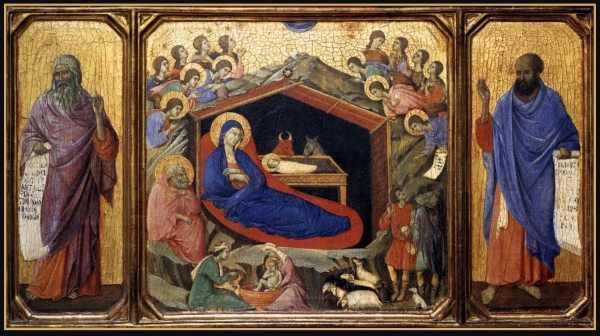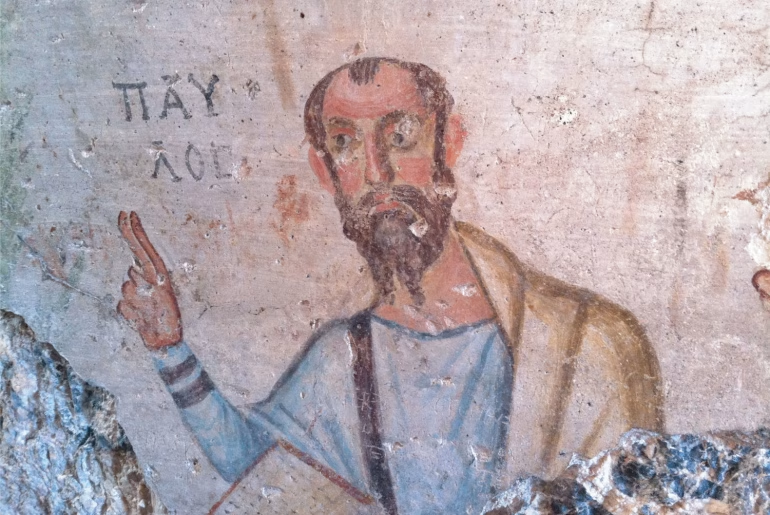The following are the stanzas from the translated work of “Hyms on Paradise” by St. Ephrem the Syrian.1 We have retained the page numbers and the strophy paragraphs whenever possible. The background story behind these stanzas is explained in our feature article “Virgins Of Paradise” In Christianity.
Content Overview
Page 119
Strophy 7.1
In times of temptation
console yourselves with God’s promises,
for there is no deceit
in the word of Him who repays all,
and His treasure house is not so paltry
that we should doubt His promise ;
He has surrendered His own Son for us
so that we might believe in Him ;
His Body is with us, His assurance is with us,
He came and gave us His keys,
since it is for us that His treasures lie waiting.
Res :
Blessed is He who, with His keys,
has opened up the Garden of Life
Strophy 7.2
In the evening the world sleeps,
closing its eyes,
while in the morning it arises.
He who repays is distant
as it were but a night’s length away ;
now light dawns and He is coming.
Weary not, my brethren,
nor suppose
that your struggle will last long,
or that your resurrection is far off,
for our death is already behind us,
and our resurrection before us
Strophy 7.3
Bear up, O life of mourning,
so that you may attain to Paradise ;
its dew will wash off your squalor,
while what it exudes will render you fragrant ;
its support will afford rest after your toil,
its crown will give you comfort,
Page 120
it will proffer you fruits
in your hunger,
fruits that purify those who partake of them ;
in your thirst
it will provide for you a celestial draught,
one that makes wise those who drink of it
Strophy 7.4
Blessed is the poor man
who gazes on that place ;
riches are poured in profusion
outside and around it ;
chalcedony and other gems
lie there cast out
to prevent their defiling
the glorious earth of Paradise ;
should someone place there
precious stones or beryls,
these would appear ugly and dull
compared with that dazzling land
Strophy 7.5
Both men and women
are clothed in raiment of light ;
the garments provided to cover their nakedness
are swallowed up in glory ;
all the limbs’ vile emotions
are silenced,
the fountains of lust
are stopped up,
anger is removed
and the soul purified
and, like wheat, it flourishes in Eden,
unchoked by thorns
Strophy 7.6
There virginity dances
because the serpent,
Page 121
who secretly poured venom into her ears,
is now destroyed ;
the fig rushes up to her
and full of joy exclaims :
“Put away your ignorant
childhood–
the day when you became naked
and hid in my bosom.
Praise to Him who has clothed
your nakedness with the robe!”
Strophy 7.7
There youth exults
because of what it has achieved ;
in Paradise it beholds
and cast away the lust
that flared up among the senseless ;
it sees too the child who overcame the asp
in its hole.
Samson overcame a lion,
but a viper conquered
and smote him, causing him straightway to lose
his Nazirite locks.
Strophy 7.8
There the married state
finds rest after having been anguished
by the pangs of giving birth, brought on by the curse,
and by the pain of childbearing ;
now it sees the children
whom it had buried amid laments,
pasturing like lambs
in Eden ;
Page 122
exalted in their ranks,
glorious in their splendors,
they are like kindred
of the spotless angels.
Strophy 7.9
Thanks be to the Merciful One
who plucked them while still young–
the children who are
the late fruits
to become in Paradise
the first fruits of all.
A novel sight may be seen there :
these “fruits” pluck
the fruiting produce,
the firstlings pluck the firstfruits.
In their purity both plucked
and plucker are alike.
Strophy 7.10
Bind up your thoughts, Old Age,
in Paradise
whose fragrance makes you young ;
its wafting scent rejuvenates you,
and your stains are swallowed up
in the beauty with which it clothes you.
In Moses He depicted for you
a parable :
his cheeks, ashen with age,
became shining and fair,
a symbol of old age
that in.
Strophy 7.11
No blemish is in them,
for they are without wickedness ;
Page 123
no anger is in them,
for they have no fiery temper ;
no mocking scorn is in them,
for they are without guile.
They do not race to do harm–
and so themselves be harmed ;
they show no hatred there,
for there they are without envy ;
they pronounce no judgment there,
for there no oppression exists.
Strophy 7.12
People behold themselves
in glory
and wonder at themselves,
discovering where they are.
The nature of their bodies,
once troubled and troublesome,
is now tranquil and quiet,
resplendent
from without in beauty,
and from within with purity,
the body in evident ways,
the soul in hidden ways.
Strophy 7.13
In Paradise the cripples,
who had never walked, leap around ;
the deformed, who had never even crawled,
fly about through the air ;
the eyes of the blind and deaf,
who had yearned from the womb,
hungering for the light
which they had failed to see,
now rejoice to behold
the beauty of Paradise,
and the mighty sound of its harps
gives comfort to their ears.
Page 124
Strophy 7.14
At him who has uttered
no curse or abuse
does Paradise’s blessing
rejoice all the more ;
upon him whose eyes’ glance
remained always chaste
does Paradise’s beauty
gaze the more ;
in the limbs of him
who quelled the venom of his thoughts
do its springs of sweetness
well up
Strophy 7.15
The virgin who rejected
the marriage crown that fades
now has the radiant marriage chamber
that cherishes the children of light,
shining out because she rejected
the works of darkness-
To her who was alone
in a lonely house
the wedding feast now grants tranquility :
here angels rejoice,
prophets delight,
and apostles add splendor
Strophy 7.16
Fasters, who have chosen Daniel’s
meager diet of vegetables
–and before Daniel kings with their crowns
bowed down and did reverence
fasters like these do the trees,
not kings, extol,
bowing down in all their beauty
and inviting them
Page 125
to turn aside to the place where they grow,
and take up their abode amid their boughs,
bathe in their dew
and rejoice in their fruits.
Strophy 7.17
Whoever has washed the feet of the saints
will himself be cleansed in that dew ;
to the hand that has stretched out
to give to the poor
will the fruits of the trees
themselves stretch out ;
the very footsteps of him
who visited the sick in their affliction
do the flowers make haste
to crown with blooms,
jostling to see
which can be first to kiss his steps.
Strophy 7.18
The man who abstained,
with understanding, from wine,
will the vines of Paradise
rush out to meet, all the more joyfully,
as each one stretches out and proffers him
its clusters ;
or if any has lived
a life of virginity,
him too they welcome into their bosom,
for the solitary such as he
has never lain in any bosom
nor upon any marriage bed.
Strophy 7.19
Those who have been crowned for our Lord’s sake
with the martyr’s death by the sword
shine out in glory there
with their crowns
Page 126
because their bodies despised
the persecutors’ fire.
Like stars do they blossom
in Paradise,
those seven sons of light
with their radiant mother,
who, in their deaths,
spurned the wrath of the impious king.
Strophy 7.20
The happiness of this place
gives joy to the women who labored
in the service of the saints :
there they see that widow
who took in Elias
savor Eden’s delights ;
instead of those two fountains
–the jar and the cruse–
which gave her her livelihood,
now the boughs of the trees
provide this in Eden
for all women who have given livelihood to the poor.
Strophy 7.21
Nothing there in Paradise
is useless :
both grass and roots
bring benefit and profit ;
whoever tastes them is rejuvenated,
whoever breathes in their scent grows fair ;
in the bosom of its blossoms and flowers
is hidden
Page 127
a veritable treasure,
a gift for those who pluck it ;
the fruits of Paradise bear rich wealth
for those who gather them.
Strophy 7.22
None toil there,
for none go hungry there ;
none endure shame there,
for none do wrong there ;
none feel contrition there,
for there is no cause to repent there.
Those who run the course
find rest and quiet.
None grow old there,
for none die there ;
none are buried there,
for none are born there.
Strophy 7.23
They know no worry,
for they have no suffering ;
they have no fear,
for no snare awaits them ;
they have no adversary,
for they have passed through the contest.
They count themselves
blessed
unendingly,
for their warfare is over ;
they have taken up their crowns
and found rest in their new abode.
Strophy 7.24
I saw that place, my brethren,
and I sat down and wept,
for myself and for those like me,
at how my days have reached their fill,
Page 128
dissipated one by one, faded out,
stolen away without my noticing ;
remorse seizes hold of me
because I have lost
crown, name and glory,
robe and bridal chamber of light.
How blessed is the person
who of that heavenly table is held worthy !
Strophy 7.25
May all the children of light
make supplication for me there,
that our Lord may grant them
the gift of a single soul.
Thus would I have renewed occasion
to praise Him
whose hand is, to be sure,
stretched out in readiness.
May He who gives
both in justice and in grace
give to me, in His mercy,
of the treasure store of His mercies.
Strophy 7.26
And if none who is defiled
can enter that place,
then allow me to live by its enclosure,
residing in its shade.
Since Paradise resembles
that table,
let me, through Your grace,
eat of the “crumbs” of its fruit
which fall outside,
so that I too may join
those dogs who had their fill
from the crumbs of their masters’ tables.
Page 129
Strophy 7.27
And may I learn how much I will then have received
from that parable of the Rich Man
who did not even give to the poor man
the leftovers from his banquet ;
and may I see Lazarus,
grazing in Paradise,
and look upon the Rich Man,
in anguish,
so that the might of justice outside
may cause me fear,
but the breath of grace within
may bring me comfort.
Strophy 7.28
Allow me to dwell by the enclosure
of that Garden, so that I may be
a neighbor to those within,
envied by those outside.
Yet who is able to look, at the same time,
on delight and torment,
to behold both Gehenna
and the Garden ?
May the crown of those within
rebuke me for all my sins ;
may the punishment of those without
teach me how great is Your mercy toward me.
Strophy 7.29
Who can endure
to look on both sides,
whose ears can stand
the terrible cries of the wicked,
who proclaim, in Gehenna,
that the Just One is righteous,
while the good utter praise
in the Garden ?
Page 130
Strophy 7.19
The two sides gaze on each other
in amazement,
the works of each side, revealed,
serve to admonish the other.
7.30
May my sins not be revealed
to my brethren on that day,
–yet by this we show
how contemptible we are, Lord ;
if our sins are revealed to You,
from whom can we hide them ?
I have made shame
an idol for myself ;
grant me, Lord, to fear You,
for You are mighty.
May I feel shame and self-reproach
before You, for You are gentle.
Strophy 7.31
A man’s neighbor has become his god :
every moment he seeks to please him ;
if he does wrong, he feels shame before him,
if he does him an injury, he is afraid ;
or if he does him some good,
then he has spoiled that good by his thirst for praise.
Such a man has become an abject slave
in all these ways.
The Good One gave us freedom,
but we have reduced this to slavery.
May we exchange, for Your lordship,
this overlord we have made for ourselves !
- St Ephrem the Syrian, Hymns on Paradise, trans. Sebastian Brock (Crestwood NY : St Vladimir’s Seminary Press, 1990).[↩]





